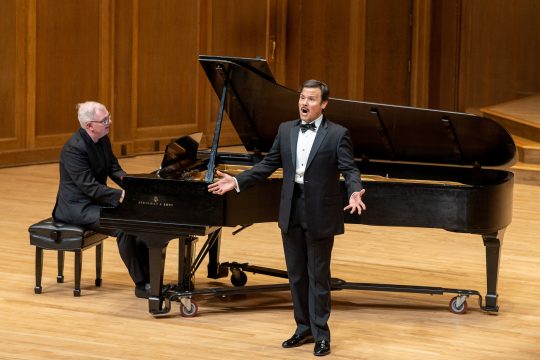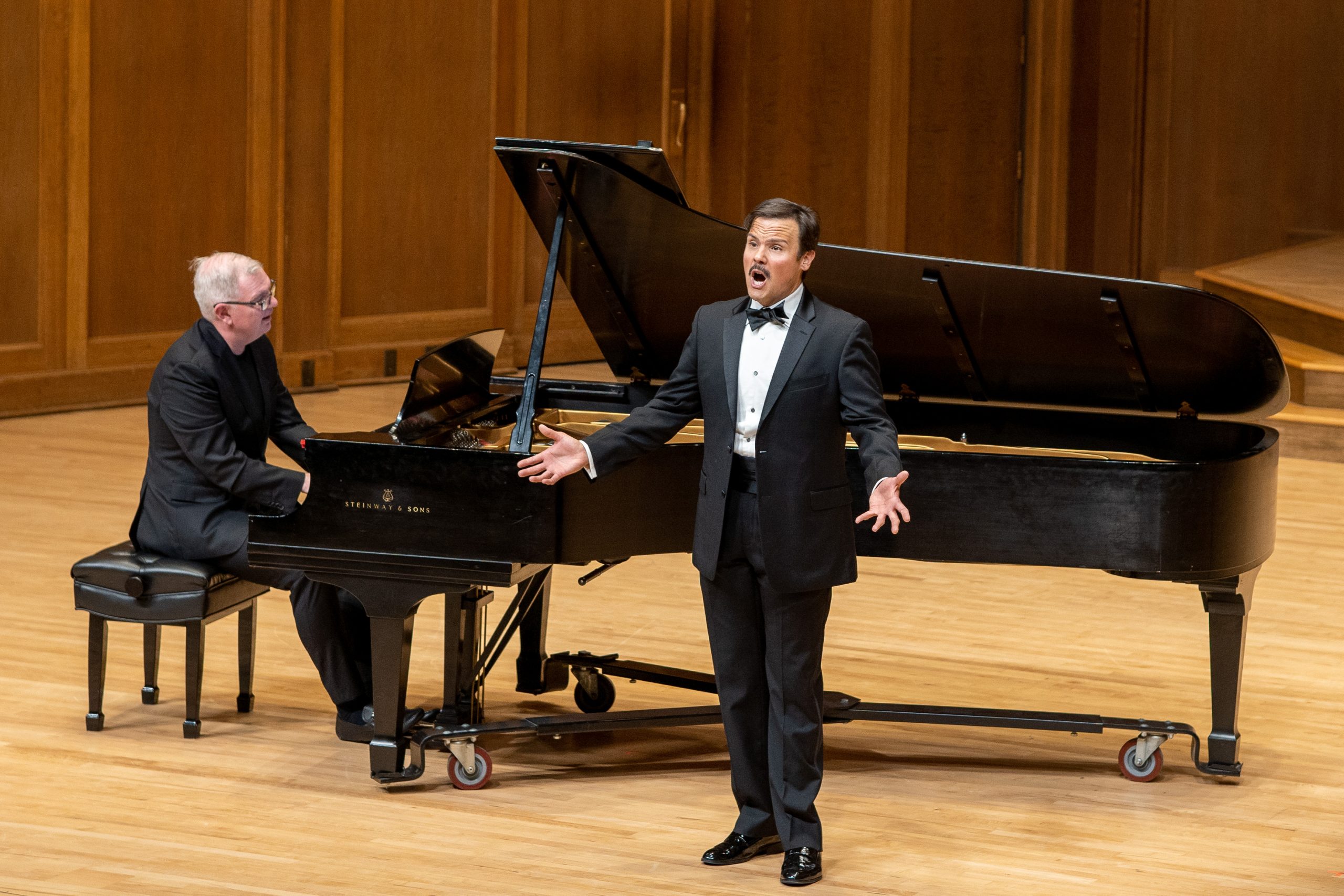On Friday, April 26, the Lawrence Memorial Chapel was graced with a concert featuring David Portillo, tenor, and Craig Terry, piano. Featuring in Lawrence University’s 2024-25 Performing Arts Series, both Portillo and Terry are well-renowned musical artists. Portillo’s biography, featured in the concert flyer, denotes that “[he] has established himself as a leading classical singer of his generation,” and it lists the innumerable amount of opera companies in which he has held a role. In the same vein, Terry’s biography describes him like so: “Grammy Award winning pianist and arranger Craig Terry enjoys an international career regularly performing with the world’s leading singers and instrumentalists.”
The duo jumped right into their performance, beginning with “Zion’s Walls” from “Old American Songs, Set 2” by Aaron Copland (1900-1990), smoothly transitioning to “Simple Song” from “Mass” by Leonard Bernstein (1918-1990), then “Canticle 1: My beloved is his and I am his” by Benjamin Britten (1913-1976), before addressing the audience. While listening to these three songs, I was surprised by the religious lyricism and started to prepare myself for a dreary hour and a half of Christian worship songs. During the third song, though, my mind drifted to the lyrics, and I began contemplating opera and whether it’s okay to change pronouns according to the singer – like some pop artists do when they record covers – as I was very sure I had heard Portillo sing masculine pronouns (“Thus I am my best beloved’s am; thus he is mine”). Perhaps the “worship” song was originally written by a woman, and it is impermissible to change the lyrics.
Interestingly, my musings were appeased. Portillo addressed the crowd, thanking everyone graciously for giving him the opportunity to be here at Lawrence and to perform for us. Of the songs, he said they were all by artists who struggled with their personal identities and where those fit into their religious identities; they grappled with the intersectionality of queerness and religion. Who knows if sacred, religious songs are okay with changing pronouns, but this answered my question. My qualms were erased, and I had a newfound appreciation for our performers, as they were addressing engaging and personal topics and were just so excited to be here!
The next four songs were poems. Portillo described the first two as “cheeky”: “An Chloe,” K. 524 and “Das Veilchen,” K. 476 by Wolfgang Amadeus Mozart (1756-1791). I’m not sure what cheeky means for music, but it was considerably upbeat. The last two poems were from “Deux mélodies de Guillaume Apollinaire,” FP 127 by Francis Poulenc (1899-1963) and were, respectively, titled “Montparnasse” and “Hyde Park.” To me, the former was dark, dramatic and slow, whereas the latter was dramatic too, but also loud and evoked feelings of distress.
Further, the next two songs were “Where the Music Comes From” by Lee Hoiby (1926-2011) and “The New Suit (Zipperfly)” by Marc Blitzstein. Portillo noted that Hoiby’s song was a mantra to himself (Hoiby) and that both Portillo and Terry felt a connection to its message depicting joy for life and for music. Blitzstein’s song was very fun. It is in a cabaret style that playfully attacks identity through the imagery of putting on a new suit — what we “wear” and what we don’t “wear” in public. This song reminded me of “Book of Mormon,” because of its playful showtune-y ambience. It uses gibberish words, and it does that phenomenon where the singer sing-talks, which may be called sprechstimme, but that may also be something different. Either way, it was a fun tune before the duo ended for intermission.
After returning from intermission, Portillo informed the crowd that the rest of the scheduled songs were in Spanish. The next four songs jumped from Spain to Argentina, back to Spain, and finally, back to Argentina: “Pampampa” by Carlos Guastavino (1912-2000), “Jota” from “Siete canciones populares españoles” by Manuel de Falla (1876-1946), “Triste” from “Cinco canciones populares argentinas” by Alberton Ginastera (1916-1983) and “Los dos miedos” from “Poema en forma de canciones” by Joaquín Turina (1882-1949).

The final six Spanish songs are favorites of Portillo and Terry. They include: “Del cabello mas sutil” from “Canciones clasicas espanolas” by Fernando Obraors, “Aleluya” by Manuel Ponce, “El dia que me quieras” by Carlos Gardel, “Despedida” by Maria Grever, “Sin tu amor” by Miguel Sandoval and “Granada” by Agustin Lara. The sound and lyrical themes vary significantly, as some are love songs, while others express extreme distress and insurmountable pain. All of them are rather beautiful.
With that, the duo reached the end of their setlist. The crowd boisterously clapped at their talent. Portillo and Terry feigned their departure and returned for an encore. Their first encore song was Portillo and his husband’s wedding song, which I thought was very endearing; apparently his husband and various family members were in the audience, so he wanted to make the performance even more special. I typed a couple lines of lyrics from the song into my notes app, so I was able to find it, thankfully: Nat King Cole’s “Orange Colored Sky.” Cole’s song is jazzy and charming, and I highly recommend giving it a listen.
The duo’s final song was by one of the artists in the first three songs, encapsulating identity. Unfortunately, I missed its title and composer, as I wasn’t expecting a second encore song and was in awe of “Orange Colored Sky.” Either way, with or without the final song title, this performance was wonderful. It might be my favorite concert that I have attended, as a result of this exciting job with The Lawrentian. It was exciting to have performers who were so excited to perform for us and so willing to share themselves and their identities for a small liberal arts school!
Don’t forget to keep your eyes peeled for guest recitals on campus and to look out for events in Lawrence’s 2024-25 Performing Arts Series.

